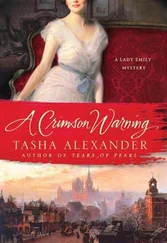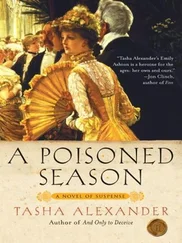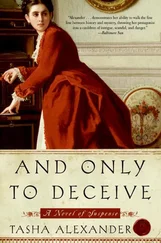And I started to cry, heaving sobs that soaked my handkerchief and shook my body to its core. I don’t know when Sebastian appeared. I never heard his footsteps nor felt his hand on my shoulder when he knelt beside me. At some point, however, I became aware I was holding a dry handkerchief and realized he’d handed it to me. His eyes were the bright sapphire blue I remembered them to be, and they were looking at me not with concern, but mischief.
“You’re as bad as I am, Mrs . Hargreaves. Although I gather I’m not to call you that. It’s Lady Emily now, isn’t it? Correct address is so important.”
“Don’t torment me,” I said.
“I’m merely applauding your performance. It was worthy of the Divine Sarah.”
“You don’t consider her a skilled actress?” I asked, wiping the rest of my tears.
“The finest. I saw her play Cleopatra not two years ago.”
“Then you should not compare her to me,” I said. “What you see before you is not acting.”
“Come, now, you can’t expect me—”
“Sometimes, Mr. Capet, all a lady has left is the truth.” He was still resting his hand on my shoulder. I removed it and rose to my feet. “I feel a certain responsibility to you—I know not why, particularly as it seems you’ve abandoned your charge.”
Sebastian had promised to look after Edward White, a young boy whom we had both encountered during Sebastian’s quest for objects owned by Marie Antoinette. Only a handful of people knew the child’s true identity—that he was the direct descendent of the last dauphin of France. The Capet family had protected Marie Antoinette’s son, Louis Joseph, after his secret escape from the clutches of cruel guards during the revolution, and it was Sebastian’s legacy to continue the tradition by looking after Edward. It was a role against which he’d rebelled, but eventually, after learning the boy had nearly been killed by a person with a vested interest in protecting the claims of a pretender to the French throne, he agreed to do his duty.
“I’ve done nothing of the sort!” he said. “He and his mother are on holiday at the seaside. They’re perfectly safe.”
“I’m not in a humor to argue with you.”
“What’s troubling you, my darling Kallista?”
“Don’t call me that.”
“You have no idea how you wound me.” He sidled closer to me.
“You have to stop this, Mr. Capet.”
“Darling, I know you call me Sebastian to everyone else. Why cling to formality when we’re alone?”
“We shouldn’t be alone. It’s inappropriate. I want you to come back to the house with me.”
“Absolutely not!” He brushed dust from his yellow waistcoat.
“Why must you make everything difficult?” I asked, tears pooling in my eyes. “I cannot take much more.”
“Darling, please.” He held out a hand; I pushed it away. “Gossip told me of your injuries, but I see that you’re well recovered if you’re able to ride. Although emotionally perhaps not quite so well as physically. What is troubling you?”
“More things than I care to recount. And if you’ve any of the qualities of a gentleman you won’t press me.”
“I shan’t press you.” His voice, low and gentle, had a rhythmic quality to it, almost musical. “Though it wounds me to think you believe I’ve any of the qualities of a gentleman.”
“My husband feels strongly that you need to present yourself to the police and give an alibi for Edith Prier’s murder.”
“You don’t think I killed her?”
“What is your alibi?”
He heaved a sigh. “When was she murdered?” he asked. “Surely you don’t expect me to keep a catalog of morbid events in my head?”
“Sebastian!”
“First name. That’s much better.”
“Alibi.”
“Right. Yes. Let’s see…Thursday…Calais. I took a room at a remarkably dim tavern across from the hotel the Whites were in after a more than usually tedious channel crossing. Terrible weather.”
“Can you prove it?”
“If I must. The owner would remember me. We had an infuriating discussion about continental politics.”
“Do you have your ticket from the ferry?” I asked.
“I suppose I do somewhere.”
“Will you please speak to Inspector Gaudet?”
“That fop?”
“You know him?”
“Only from watching you talk to him.” He gave an overdramatic sigh. “If it will release you from even a small measure of stress, I can hardly refuse.”
“It will also keep you from the guillotine,” I said.
“A not unwelcome perk.”
“There’s one more thing I need from you.” I untied my horse and started to walk. “Come with me.”
“Very well. I may as well accept the inevitable. Is the dashing Mr. Hargreaves at home? I’ve been meaning to call on him for some time.”
8 July 1892
An intruder in my house! I know not what alarms me more—his very presence or the fact that I slept so soundly and undisturbed during his visit. So far as any of us can tell, he’s taken nothing beyond our sense of security, but I am most displeased. I dislike the violation, even more now that I’m aware he’s no stranger to my incorrigible daughter-in-law. It is as if she has brought an unending supply of disturbance with her.
I can’t believe I lent a book to a person of such dubious acquaintance.
I’ve had a letter from Lady Carlisle this morning, pleading with me to return to London. It seems the Women’s Liberal Federation, a group in which I’ve been intimately involved (albeit from a distance) since its inception, is in the midst of heated controversy. They’ve decided to press forward with an agenda that includes actively pursuing the right of women to vote. All members of the fair sex throughout Britain ought to rejoice at such news. But instead, at least ten thousand of our members have renounced the organization in protest. Rumor has it they’re starting a group of their own, one that will not support suffrage, and I’m afraid the Liberal Party leadership may prefer their priorities. What good is fighting for women’s rights if those rights don’t include being able to vote?
More ruckus beginning outside. I shall investigate and see what new inconvenience is to be heaped upon my household.
The walk back to the house was a short one, and after releasing the horse to a stable boy, I let Sebastian take my arm (only to keep him from trying to dash away) and led him into the drawing room, where Mrs. Hargreaves greeted us with raised eyebrows and an appropriate look of horror. I did detect in her eyes a slight glimmer of hope—perhaps she thought Madame Bovary had started to wear off on me. But it was Cécile’s reaction that I most cherished.
“Mon dieu!” she cried, leaping to her feet and kissing Sebastian on both cheeks. “Those eyes…the color of sapphires. Stunning.”
“Madame du Lac.” He bowed low and kissed her hand with an affected reverence. “It is a delight to no longer be relegated to admiring you from afar.”
“I am glad to see you,” she said, looking him up and down. “I’ve always believed that it is a rare and magical thing to find a gentleman of such refined taste. Particularly one who will go to such unspeakably magnificent lengths to satisfy his every artistic whim.”
“It is never whim, madame, I assure you. I am driven only by the most carefully orchestrated motivations.”
“What a pity Monsieur Leblanc has already taken his leave from us,” Cécile said. “I’m quite certain he would have been delighted to make your acquaintance. You might inspire his fiction.”
“Fiction?” Sebastian asked. “Is this gentleman a writer?”
Читать дальше












